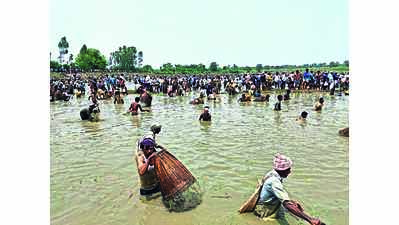- News
- City News
- hubballi News
- ‘Meenu Habba’ resumes in Haveri villages
Trending
This story is from May 8, 2022
‘Meenu Habba’ resumes in Haveri villages
After a two-year gap due to Covid-19, the traditional fish-catching art of ‘bamboo fishing’ to mark ‘Meenu Habba’ has resumed in the rural areas of Haveri.

Haveri: After a two-year gap due to Covid-19, the traditional fish-catching art of ‘bamboo fishing’ to mark ‘Meenu Habba’ has resumed in the rural areas of Haveri. The event was held at Kyasanur village tank in Hangal taluk, and people of Kyasanur, Hanumanakoppa, Balehalli, Belur, and Chikkaunshi-Hosur, which fall under the semi-Malnad region in Hangal taluk, took part in the event recently.
Meenu Habba (fish fest) is not just a mass fishing activity but an intangible tradition.
The fest didn’t have historical significance, but villagers have been continuing the tradition started by their ancestors. The festival is celebrated in these villages, especially after Ugadi festival and before the monsoon sets in. Traditionally, all tanks in this region would have water till monsoon.
According to sources, the fishing activity takes place throughout the year in many tanks in and around the Hangal taluk. But there are few tanks where it takes place strictly only during the festival. Verities of fishing including Murgodu, Gauri, Katla, Bale, Roo, Kuchchu, and Gaskar are available in this tank.
On most occasions, not a single person returns without a catch, and the fee remitted is refunded to unlucky participants who fail to trap any fish, he added.
Jogappa Barki, a villager from Kyasanur shared his experience. The fish fest has provided a pleasant experience given how fish farming and fishing have become commercial elsewhere. It ensures an opportunity to learn traditionally and nearly lost fishing technics and tools. The festival brings in a sense of identity and togetherness. It is also a means to ensure peace, harmony, and comradeship among communities,” he said.
Meenu Habba (fish fest) is not just a mass fishing activity but an intangible tradition.
The fest didn’t have historical significance, but villagers have been continuing the tradition started by their ancestors. The festival is celebrated in these villages, especially after Ugadi festival and before the monsoon sets in. Traditionally, all tanks in this region would have water till monsoon.
According to sources, the fishing activity takes place throughout the year in many tanks in and around the Hangal taluk. But there are few tanks where it takes place strictly only during the festival. Verities of fishing including Murgodu, Gauri, Katla, Bale, Roo, Kuchchu, and Gaskar are available in this tank.
“On the day of the fish fest, the participants enter the tank holding the traditional bamboo fishing trap and they can catch any quantity of fish as there is no cap on that day. But they shouldn’t use other materials like fish-catching nets and they must use only the bamboo fishing trap. The participants are permitted to sell the catch on the spot. There will be people waiting to buy the fish near the tank,” said T Shivakumar, a teacher from a government primary school.
On most occasions, not a single person returns without a catch, and the fee remitted is refunded to unlucky participants who fail to trap any fish, he added.
Jogappa Barki, a villager from Kyasanur shared his experience. The fish fest has provided a pleasant experience given how fish farming and fishing have become commercial elsewhere. It ensures an opportunity to learn traditionally and nearly lost fishing technics and tools. The festival brings in a sense of identity and togetherness. It is also a means to ensure peace, harmony, and comradeship among communities,” he said.
End of Article
FOLLOW US ON SOCIAL MEDIA










